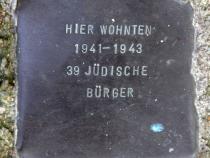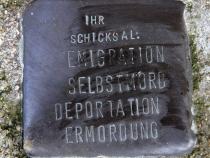Location
Solinger Straße 10
Historical name
Tile Wardenberg Str. 2
District
Moabit
Stone was laid
September 2003
Born
04 January 1877 in Culmsee (Westpreußen) / Chełmża
Deportation
on 03 October 1942
to
Theresienstadt
Dead
im Ghetto Theresienstadt
Paula Henschel was born on 4 January 1877 in Culmsee (now Chełmża, Poland) in West Prussia. Shortly before her thirtieth birthday, on 18 December 1906, she married Max Blumenthal, a merchant, in her home town. They had two children. Ellen was bon on 22 December 1909 in Graudenz (Grdudziąz) on the River Vistula; Gerd was born on 24 February 1915. During the First World War, her husband served in the army while she stayed at home alone with the children.
The family lived for many years in Greifswald. Paula Blumenthal and her husband ran a leather goods store, Schlesinger & Co. Felle und Häute, which was registered under her name. Her children and her son-in-law Otto Herz, whom her daughter Ellen married in 1931, also worked in the family business. In early 1933 Ellen and her husband moved to his home city Zurich “because of the untenable political situation”, as she later wrote in her application for compensation. Here, in April 1933 and October 1937, Paula Blumenthal’s grandchildren Renate and Peter Albert were born.
Consequent to the Nazis’ anti-Jewish measures, Paula and Max Blumenthal were forced to give up their business. In early October 1937 they moved to Berlin; their son Gerd emigrated to Colombia. As they had no source of income after the closure of their business, their daughter supported them from Switzerland. Ellen also paid for her brother’s escape with her dowry. In Berlin, Paula Blumenthal and her husband lived initially on Weydinger Straße, which the Nazis had renamed Horst Wessel Straße, in Mitte, and later moved to an apartment at Tile Wardenberg Straße 2. In April 1941 they moved into a rented room at Solinger Straße as subtenants. As Paula Blumenthal’s health was failing, she was spared the news of her granddaughter Renate’s death in Zurich on 13 March 1942. A friend of the family named Auguste Ruschke wrote the following lines to Ellen in 1948: “I knew you had lost little Renate. But we didn’t tell mummy about it. She always had so much trouble with her heart and severe problems with her eyes, too, her sight was so bad, sometimes I felt so sorry for her. Otherwise, so long as she was here, she was relatively alright. I went there a lot and did what I could. I often did the laundry for her and all sorts of other things that she couldn’t do.”
On 3 October 1942, Paula Blumenthal was deported with her husband on the “3rd major transport of the elderly” to Theresienstadt. Auguste Ruschke recalled their departure in her letter to Ellen: “The Sunday they left, I’ll never forget for the rest of my life, I knew we would never meet again. Mummy and Daddy asked me to stay in contact with you, if I survive. And I promised I would. Daddy was very dejected that evening, but Mummy was very self-composed. She was so happy to receive any little gift, like a little child. She was especially pleased about a bag I had managed to buy and then packed full of rolls and sandwiches. So, she at least had something for the journey. Daddy was so happy about that, too, he broke out in tears.”
After nine months in Theresienstadt concentration camp, Max Blumenthal died, on 18 July 1943. Ellen received the news of his death via a postcard from her aunt Berta Cohn in Theresienstadt. Berta wrote that her mother was composed but very upset. On 29 October 1943, Paula Blumenthal also died in Theresienstadt. Berta Cohn wrote to Ellen and Otto Herz on 10 November 1943: “Dear ones: Writing to let you know that your dear mother followed your dear father on 29 October. She waited for news from you to the last.”
The family lived for many years in Greifswald. Paula Blumenthal and her husband ran a leather goods store, Schlesinger & Co. Felle und Häute, which was registered under her name. Her children and her son-in-law Otto Herz, whom her daughter Ellen married in 1931, also worked in the family business. In early 1933 Ellen and her husband moved to his home city Zurich “because of the untenable political situation”, as she later wrote in her application for compensation. Here, in April 1933 and October 1937, Paula Blumenthal’s grandchildren Renate and Peter Albert were born.
Consequent to the Nazis’ anti-Jewish measures, Paula and Max Blumenthal were forced to give up their business. In early October 1937 they moved to Berlin; their son Gerd emigrated to Colombia. As they had no source of income after the closure of their business, their daughter supported them from Switzerland. Ellen also paid for her brother’s escape with her dowry. In Berlin, Paula Blumenthal and her husband lived initially on Weydinger Straße, which the Nazis had renamed Horst Wessel Straße, in Mitte, and later moved to an apartment at Tile Wardenberg Straße 2. In April 1941 they moved into a rented room at Solinger Straße as subtenants. As Paula Blumenthal’s health was failing, she was spared the news of her granddaughter Renate’s death in Zurich on 13 March 1942. A friend of the family named Auguste Ruschke wrote the following lines to Ellen in 1948: “I knew you had lost little Renate. But we didn’t tell mummy about it. She always had so much trouble with her heart and severe problems with her eyes, too, her sight was so bad, sometimes I felt so sorry for her. Otherwise, so long as she was here, she was relatively alright. I went there a lot and did what I could. I often did the laundry for her and all sorts of other things that she couldn’t do.”
On 3 October 1942, Paula Blumenthal was deported with her husband on the “3rd major transport of the elderly” to Theresienstadt. Auguste Ruschke recalled their departure in her letter to Ellen: “The Sunday they left, I’ll never forget for the rest of my life, I knew we would never meet again. Mummy and Daddy asked me to stay in contact with you, if I survive. And I promised I would. Daddy was very dejected that evening, but Mummy was very self-composed. She was so happy to receive any little gift, like a little child. She was especially pleased about a bag I had managed to buy and then packed full of rolls and sandwiches. So, she at least had something for the journey. Daddy was so happy about that, too, he broke out in tears.”
After nine months in Theresienstadt concentration camp, Max Blumenthal died, on 18 July 1943. Ellen received the news of his death via a postcard from her aunt Berta Cohn in Theresienstadt. Berta wrote that her mother was composed but very upset. On 29 October 1943, Paula Blumenthal also died in Theresienstadt. Berta Cohn wrote to Ellen and Otto Herz on 10 November 1943: “Dear ones: Writing to let you know that your dear mother followed your dear father on 29 October. She waited for news from you to the last.”




